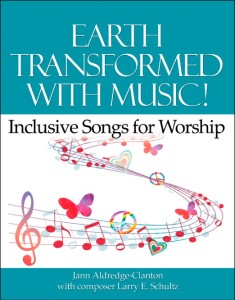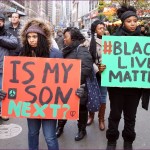 My friend and colleague Rev. Jann Aldredge-Clanton has just published a new book titled Earth Transformed with Music! Inclusive Songs for Worship. I’ve written about and shared some of her work here on this blog before. I asked Jann a few questions about her new book.
My friend and colleague Rev. Jann Aldredge-Clanton has just published a new book titled Earth Transformed with Music! Inclusive Songs for Worship. I’ve written about and shared some of her work here on this blog before. I asked Jann a few questions about her new book.
1. Tell us why you put together this collection of hymns.
Music has great power to touch the heart and change the world. Words we sing in worship shape our beliefs and actions. They have great power because of the sacred value given to them, and because the music embeds the words in our memories. The majority of churches, even progressive churches, still use hymns with mostly male names and imagery for Deity, inadvertently supporting gender injustice and inequality. Biblical female divine names and images are excluded from most hymns. So I continue to answer the call of Ruah, the Creative Spirit, to write inclusive hymn lyrics and to publish them in hymn collections for faith communities to use in worship.
Earth Transformed with Music! Inclusive Songs for Worship is my third collection of hymns; the first two are Inclusive Hymns for Liberating Christians and Inclusive Hymns for Liberation, Peace, and Justice. I’ve collaborated with composer Larry E. Schultz on these hymn collections, as well as on a children’s musical, a children’s songbook, and choral anthems. All include biblical female divine names, such as “Wisdom,” Sophia, Ruah, Shaddai, Shekhinah, “Mother,” “Midwife,” “Mother Hen,” and “Mother Eagle.” These female names of the Divine help to transform patriarchal structures that continue to support worldwide oppression of women and girls. When we include female names for Deity, women and girls are seen in Her image and thus respected and valued instead of being oppressed and abused. Gender-balanced names and images of the Divine affirm the sacred value of all people and all creation, supporting justice and peace in our world.
More and more congregations, communities, and small groups are seeking inclusive hymns that reflect their beliefs of gender equality and justice. They have affirmed my hymn writing and encouraged me to keep writing more hymns that include female divine names and images. So I continue writing lyrics, and Ruah continues to inspire me!
2. How does Earth Transformed differ from your previously published hymnbooks?
This collection includes all new songs. In the previously published hymnbooks I organized the hymns according to general themes of justice, liberation, and peacemaking. Many of the hymns in Earth Transformed with Music! address specific justice issues, such as workers’ rights. I organized the hymns according to justice issues, such as racial equality, gender equality, marriage equality, economic justice, care of creation, and interfaith collaboration, that also form the organizational structure for She Lives! Sophia Wisdom Works in the World, a book with stories of fascinating pioneers who are changing the church by reclaiming multicultural female images of Deity. I hope that Earth Transformed will be used as a companion to She Lives!, bringing change through story and song.
This book also differs from my previously published hymnbooks in that it includes multigenerational short songs for various parts of worship services, such as invocations and benedictions. Larry composed beautiful new music for these short songs.
3. How is it a challenge and an opportunity to write hymns for interfaith settings?
The challenge is to find tunes that various faith traditions have in common and/or to create new tunes. Earth Transformed with Music! includes tunes such as “Bunessan” (made popular by Cat Stevens’ “Morning Has Broken”) and “America” (popular tune for “My Country ‘Tis of Thee”), as well as wonderful, easy-to-sing new tunes that Larry created.
Writing songs for interfaith settings is indeed a great opportunity! Singing is a wonderful way to bring people of diverse religious and spiritual traditions together to contribute to justice and peace. When we take down divisive walls, we discover our common values and the power of our combined efforts to transform our world. One of the songs in this new collection, “In Unity We Gather,” concludes with this celebratory stanza:
In faith we are united, in hope and love set free;
through bridging our divisions we claim all we can be.
Together we envision a peaceful global home;
within Creative Mystery we find a deep Shalom.
4. Which do you prefer: writing new words for familiar tunes, or writing new songs entirely?
That’s a difficult question because I love doing both! Familiar tunes provide a rhyme and rhythm structure I like working with. Also, it’s rewarding to write new inclusive words to tunes that I grew up with and that I love but can no longer sing because of the exclusive theology of the original words. Many people have told me that they’re delighted that I’ve reclaimed some of their favorite hymn tunes, and music ministers have told me that it’s often easier to get congregations to sing new words to familiar tunes that provide continuity to their traditions.
 On the other hand, writing words for new music gives me freedom in creating the poetry. For this new collection I first wrote the lyrics for all of the short songs for various parts of worship, and then Larry created wonderful new music that enhances my lyrics. This is also how we wrote our children’s musical, children’s songbook, and choral anthems. In Earth Transformed, as in our first two hymn collections, Larry also wrote new music for some hymns that I’d written to familiar tunes, and we include the lyrics to the familiar tune side by side with the lyrics to the new tune so that congregations can choose to sing either or both.
On the other hand, writing words for new music gives me freedom in creating the poetry. For this new collection I first wrote the lyrics for all of the short songs for various parts of worship, and then Larry created wonderful new music that enhances my lyrics. This is also how we wrote our children’s musical, children’s songbook, and choral anthems. In Earth Transformed, as in our first two hymn collections, Larry also wrote new music for some hymns that I’d written to familiar tunes, and we include the lyrics to the familiar tune side by side with the lyrics to the new tune so that congregations can choose to sing either or both.
5. What else would you like people to know about this new hymnbook?
For congregations beginning the movement to inclusive language, this new collection provides hymns that draw from the wealth of biblical gender-neutral names for Deity, such as “Friend,” “Love,” “Spirit,” and “Maker.” Then as congregations move to what Presbyterian pastor Rebecca Kiser calls “gender-full” language for the Divine, they will find in this new collection hymns that reclaim biblical female divine names and images. This new hymnbook also includes hymns that feature important, often-overlooked biblical women, such as Miriam and Mary Magdalene. Earth Transformed with Music! invites people to join in transforming the world through singing inclusive songs that give birth to justice and peace.
To hear some of Jann’s lovely work, head on over to her YouTube channel.












